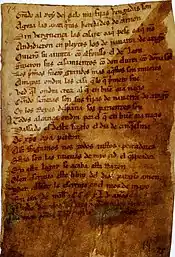Chilote Spanish
Chilote is a dialect of Spanish language spoken on the southern Chilean islands of Chiloé Archipelago (Spanish: Archipiélago de Chiloé or simply, Chiloé). It has distinct differences from standard Chilean Spanish in accent, pronunciation, grammar and vocabulary, especially by influences from local dialect of Mapuche language (called huilliche or veliche) and some conservative traits.
| Chilote Spanish | |
|---|---|
| Chilote, castellano chilote | |
| Pronunciation | [tʃiˈlote], [kahte'ʝano tʃiˈlote] |
| Native to | Chiloé Archipelago, Chile and vicinity. |
| Latin (Spanish alphabet) | |
| Language codes | |
| ISO 639-3 | – |
| Glottolog | None |
| Spanish language |
|---|
 |
| Overview |
| History |
| Grammar |
| Dialects |
| Dialectology |
| Interlanguages |
| Teaching |
After the battle of Curalaba (1598) and the Destruction of the Seven Cities Chiloé was further isolated from the rest of Chile and developed a culture with little influence from Spain or mainland Chile. During the 17th and 18th centuries most of the archipelago's population was bilingual and according to John Byron many Spaniards preferred to use the Local Huilliche language because they considered it more beautiful.[1] Around the same time, Governor Narciso de Santa María complained that Spanish settlers in the islands could not speak Spanish properly, but could speak Veliche, and that this second language was more used.[2]
Phonology
- As in Chilean Spanish, the /s/ is drawn at the end of the syllable and the /d/ between vowels tends to be removed .
- Aspired realization of /j/ as [h].
- Transformation of the groups [bo , bu , go, gu] into [wo, wu] .
- Preservation of the nasal consonant velar /ŋ/ (written "ng" or "gn") in words of Mapuche origin. This phoneme does not exist in standard Spanish. Eg: culenges [ku'leŋeh] (In the rest of Chile, it is said culengues [ku'leŋgeh]).
- Difference in treatment for y and ll : From Castro to the north, no difference is made between them, since both are pronounced as [j] ( yeísmo ). In sectors of the center and the south they are pronounced differently, they can be [je] and [dʒ], [j] and [ʒ] or [dʒ] and [ʒ]. There are also other places in the southern and western parts where they are both pronounced [ʒ].
- It is common for ch to be pronounced as a fricative [ʃ], similar to an English "sh". This fricative pronunciation is not well seen in Chile.
- In some places the group tr is pronounced differently according to the etymology of the word: if it comes from Spanish, both consonants are clearly pronounced, while if the word comes from Mapudungun, it is pronounced [tɹ], similar to a "chr". However, in the rest of the places, the words of Mapuche origin that had this consonant have replaced it by the ch and in the rest this group is pronounced [tɾ] as in most dialects of Spanish, unlike what occurs in Chilean Spanish, in which you tend to use [tɹ] regardless of the origin of the word.
- Paragoge: A vowel is added to the end of words ending in r or c . Eg: andar [an'darə], Quenac [ke'nakə].
- The prosodic aspects of Chiloé Spanish have recently been studied and show an ascending intonation.
References
- Byron, John. El naufragio de la fragata "Wager". 1955. Santiago: Zig-zag.
- Cárdenas, Renato; Montiel, Dante y Hall, Catherine. Los chono y los veliche de Chiloé. 1991 Santiago: Olimpho. p. 277 p